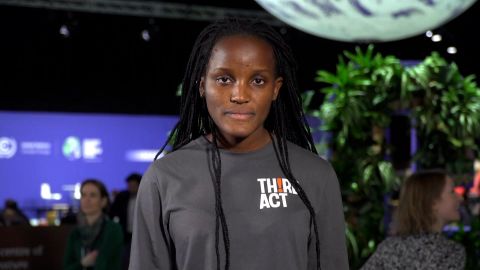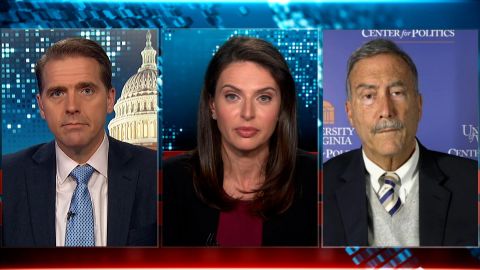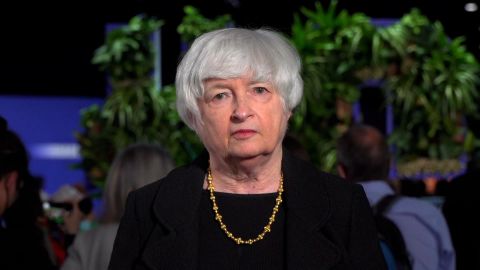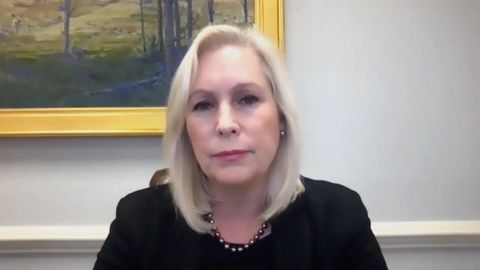Read Transcript EXPAND
BIANNA GOLODRYGA: Well, now, as we’ve discussed, last night’s election results could increase pressure on Democrats to enact President Biden’s agenda. In a major shift today, House Speaker Nancy Pelosi said she would reverse course and include paid family and medical leave in the social spending package. One of the provision’s key backers, New York Senator Kyrsten Gillibrand. Here she is talking here to Michel Martin about how she plans to convince fellow Senator Joe Manchin to get onboard.
(BEGIN VIDEO CLIP)
MICHEL MARTIN: Thanks, Bianna. Senator Gillibrand, thank you so much for talking with us today.
SEN. KIRSTEN GILLIBRAND (D-NY): You’re welcome.
MARTIN: As we are speaking now for people who haven’t been following this as closely, a number of popular provisions were taken out of the big bill the Democrats are evaluating and you have been fighting to get paid family leave back in. Where do things stand now as we are talking?
GILLIBRAND: Well, I’m still negotiating with Senator Manchin. Senator Manchin came to this issue earlier in the week without a lot of background information. So, I not only explained to him what paid leave is for, it’s for families that are in urgent crisis, whether it is a sick or dying family member, whether it is a new baby, whether you’re ill yourself. These are all moments when families need someone to care for a loved one. And we saw during the COVID epidemic over the last year and a half that without the support of a real paid family medical leave program it left a lot of families having to quit their jobs. 5 million women lost their jobs during this pandemic and millions are still trying to get them back. And so, I started there and then went through all of the questions that Senator Manchin had. And we are in a place where I am trying to write some legislation that he could support based on the framework he has offered.
MARTIN: You certainly know this issue as well as anybody. You’ve been fighting for this issue for years now. But for people who don’t, you know, only about one-quarter of American workers have some access to paid family leave. Lower wage workers are the least likely to have access. You know, only about 46 percent of working adults were eligible for even unpaid family leave. And of those, only a minority could actually afford to take unpaid time off. And this, of course, you certainly know, the United States is an outlier among nations worldwide and certainly among peer economies in offering no national program of paid family leave. So, there were a couple questions on this, is why do you think the United States is such an outlier in this? And is Senator Manchin aware of those numbers? At least, was he before you pointed them out?
GILLIBRAND: He was not aware of this issue largely until I really started to work with him to explain sort of this is harming the U.S. competitiveness to be the only industrialized country without paid leave. It just means workers are constantly being undermined and can’t necessarily stay in a job when these family emergencies hit. Families have to make these tough decisions. Do I quit my job to meet the need of a loved one who may be sick or dying? Or to care for myself? Or do I work and not meet that need? Those are terrible choices that families frankly shouldn’t have to be making. And we know in the states that have paid leave, it works. California businesses say — 90 percent of them say it had no negative impact on their bottom line or a positive impact and 99 percent of businesses said it had a positive impact on retention and morale. So, the reason the U.S. does not have paid leave is a more complex answer. We are very focused in the United States on keeping workers in the work place. I think a lot of European countries, Asian countries, they don’t necessarily assume women will stay in the work place. And so, they will offer far longer leaves and not necessarily have any care infrastructure if they are not themselves on leave with a new child for example. There’s affordable day care at three months, as an example.
MARTIN: So, (INAUDIBLE) other countries paid family leave is really an extension of some sort of income support, income floor, it is not really geared toward…?
GILLIBRAND: It is not geared toward work. It is geared towards a societal view that it is appropriate — especially for parental leave, that it is appropriate for a primary care giver, typically a mother to stay home with an infant for three months, six months, nine months, a year or two years. But what the United States is trying to accomplish is rewarding work, urging people who want to be working to be working at their fullest capacity. The problem when you don’t have paid leave especially in the terms of parental leave or even for care giving, is that more often than not women are the care givers, meeting the needs of the elderly or dying parents, meeting the needs of the new baby. When that person, that female worker does not have leave, they often are forced to quit their job to meet that family emergency. And then, when they try to get rehired, they are rehired for less money, back at the bottom rung. This is a dynamic that we call the sticky floor. They can’t get off the floor of wages. They can’t get above the minimum wage because every time a family emergency happens, they are the ones to cut back, have to leave the work force. And getting back in the work force is difficult and it costs them experience, it cost them their salary and it cost them their ability to earn their highest potential. And it is why there’s, over time, such a massive differential between men and women in the work place. It is one of the reasons why beyond — and there are others — why women still earn on average 78 cents on the dollar for the same work as men.
MARTIN: So, what is Senator Manchin’s objection? Does he have some philosophical objection to offering this kind of program or is it the total price tag that he finds objectionable and he is just looking for places to save? What is his objection? Has he articulated it to you clearly?
GILLIBRAND: Based on my conversations, it is neither of those things. He actually supports paid leave and said those words many times. I support paid leave. I just don’t want to do it now. Or I support paid leave, I just think we can do it with Republicans. So, he is not against paid leave but I think he is deeply misinformed about what our colleagues on the Republican side of the aisle are willing to do. I’ve talked to them at length, in depth. And there is interest in paid leave but their view of paid is very different. For example, President Trump ran on paid leave, too. And so, when he was president, he put four weeks of paid leave in both of his budgets. It wasn’t for all life events. It was just for parents and it was just four weeks. What we want, what I want, what any — all the — what the advocates for paid leave want is starting at 12 weeks, because we know, just take parental leave for example, very few daycares take children younger than 12 weeks. So, 12 weeks is the right number especially for parental leave. It’s also the right number for lots of illnesses and for end of life. So, he’s is not against leave and he’s not against the idea of it. What seems to be his issue is how you pay for it. He doesn’t want it to be just funded by the government. He doesn’t want it to be a safety net that isn’t self-sustaining. And I understand that. Because when I initially wrote paid leave, we wrote it to be an earned benefit exactly like Social Security where you would buy in across your lifetime, just putting in a percentage of your income. Today, that would probably be about 0.5 percent of your income and matched by your employer all told about 1 percent of your income putting into a fund for all workers. And then, you get a leave that up to three months and it would be capped. It would be capped at maybe $5,000 a month. Something like that is what we are trying to pass. And I think I could — I’m going to offer to Senator Manchin a way to pay for this bill that is an earned benefit, that is — have attributes of employer-employee matches in it to see if it is something he is willing to do.
MARTIN: What is your sense of the viability of this? I mean, one of the arguments —
GILLIBRAND: Oh, it is viable.
MARTIN: But one of the arguments President Biden had made is that this is the best moment to make these kinds of critical economy shifting investments that would position the economy, the American economy for the future.
GILLIBRAND: Absolutely.
MARTIN: So, the argument is if we don’t do it now when are you going to do it? And so, that’s —
GILLIBRAND: If we don’t do it now, it won’t be done for five or 10 years. We are in a moment of time that is unique because we just saw what the lack of paid leave did to our economy. 5 million women losing their jobs is an extraordinary number. And it just showed how there is no safety net for this care economy. There is no — you know, too much of our economy is based in the mad men era back in the 1950s and 1960s when it was more likely that a parent stayed at home. Today, I think the number of parents who stay is 15 percent or less. So, you’re talking about 85 percent of the work force that’s either sole or primary wage earner or two wage earners. That is the reality of families today. So, to allow your work force to fully recover post pandemic, which is President Biden’s vision, this is part of what he imagined to create a growing economy, this is a tool he wants in his tool box, and he wants it passed.
MARTIN: But what about on the business side of it? What would be your argument to businesses for why this is in their interests?
GILLIBRAND: I would just urge them to look at the data out of New York and California. California has had it over 10 years and the business community loves paid leave. And they said it had — literally, 90 percent polled said it had no negative impact on their bottom line or a positive impact. And 99 percent said improved retention and morale. So, the business communities like this bill. And small businesses love it. Because they can’t compete with the big stores. They can’t compete with big successful businesses that have economies of scale and can offer better benefits unless there is a federal paid leave program, they can’t compete. Also, small states can’t compete. New York, California, New Jersey, we can have paid leave plans because we have huge populations. A small state like North Dakota, which I went to visit with Former Senator Heidi Heitkamp, we toured all these small businesses and they all said, oh, my gosh. If you had a federal program I could buy into, I would love it. It is not expensive. The most it’s going to be is a small percentage of your employees’ salary and you could guarantee paid leave when they need it. And the reason it works for a small business is because if that person needs paid leave, they can go off, have their baby, care for their baby, and come right back. They don’t need to find a new worker. They don’t need to train a new worker. And just to be able to make due for three months, find a replacement worker is so much less expensive. All that time and effort put into that employee that they want to retain will come right back. Moreover, they get to compete with bigger employers to keep the ones and to — more of the ones they want because they have good benefits as well. So, this is a win for small businesses and small states if you have a national program. And we desperately need a national program.
MARTIN: Before we let you go, I wanted to talk about the election results last night. As we are speaking now, there were what are called off year elections and the ones people are closely following are in Virginia and New Jersey. New Jersey is too close to call, at least in the governor’s race. But in Virginia, the former governor, Terry McAuliffe, lost his bid to regain his seat to first time candidate, Republican Glenn Youngkin. A first-time candidate, a business candidate who was running, frankly, on some of the same culture war issues that animated the Trump presidency, talking about, you know, critical race theory, which is not taught in Virginia schools, K through 12. But, also, talking about sort of tax reform, eliminating the grocery tax and sort of things like that. I’m just wondering, what is your take on it?
GILLIBRAND: You know, I do think elections are quite cyclical. And I think that there is a natural tempo to things. But I can’t Monday morning quarterback a governor’s race that I didn’t really know much about. But I do believe it takes time for people to understand what we’re actually trying to accomplish. And I do believe that when we do pass these bills and talk about what we are fighting for, affordable daycare and universal pre-K and a paid leave plan and affordable housing and ways to clean up water. So, this is what we’re trying to accomplish. And I think when we focus on what we are for and we actually talk about how we’re lowering costs for prescription drugs, how we’re lowering costs for day-to-day bills that families have like daycare, I think that’s a choice voters can make. And I don’t know if those are the issues that the governor’s races were about, but that is certainly what we’re working on here in the Senate.
MARTIN: The president’s currently low approval ratings, his — well, how do you understand that? He is fighting for the things Democrats said that they wanted. Doesn’t seem to be picking stupid fights. What do you think is going on and do — because —
GILLIBRAND: You know, we’re in a very 24/7 world these days. People want things done now. And so, they are less patient than things take. And one thing I’ve learned in my time here in Washington is that things always take longer than you imagine. And, you know, I also — I just thought of something on the governor’s race in Virginia, you know, a lot of things that Republican ran on, it was — they were lies. I mean, one of the challenges we’re up against is just the fact that there’s no standard of truth anymore. And it is frustrating because, as you said, critical race theory isn’t taught in Virginia schools. He just made it up. He wanted a dog whistle. He was literally being racist in his campaign. And unfortunately, that is the legacy of Donald Trump, racism and division. And I’m sorry that Terry McAuliffe’s message wasn’t able to break through what the candidate in Virginia, Youngkin, said because he just — he was lying and he was dividing the nation. And I hope our politics can move away from that in the years to come. Because President Trump really did damage, the climate of politics by giving permission for people to lie about facts and to race bait and to distort people’s fears. I think a lot of the parents’ rights movement is about fear. And I think parents are very worried about their children and they want what is best for their children. But when you try to mislead them about the importance of keeping safe, getting vaccines, wearing masks, you’re playing with people’s lives. And I think what Youngkin did was do exactly that, and it is a shame.
MARTIN: Does this give you concern about the midterm elections which are coming very soon?
GILLIBRAND: You know, I think we have great candidates for the midterm. And I know which races are tightest in the country, which states are red and purple. But the candidates that are running in those places are extraordinary and I really believe in them. And so, I think woe cane can hold the Senate. And a lot of the candidates in the House who won in these red and purple suburban districts are among the strongest legislators I know. People like Lauren Underwood and Lucy McBath are extraordinary. And yes, their seats are purple and red but I still believe they’ll win re- election because they are that effective at representing their constituencies. I feel the same way about Reverend Warnock and Mark Kelly in the Senate. I think they’re so effective in their jobs and fighting for working families and helping businesses grow in their states that I think their states will vote for them. So, I think it’s about who you are and what you fight for and whether you meet the moment with what you’re for. And I think that ultimately always decides elections. And I think that we will have the candidates that — and the values and what we’re fighting for that people need. So, I’m optimistic that we can hold these Senate seats and hold these House seats.
MARTIN: Senator Gillibrand, Democrat of New York, thank you so much for talking with us today.
GILLIBRAND: Thank you.
About This Episode EXPAND
Janet Yellen says Biden’s spending bills are critical for economic growth. Scott Jennings and Larry Sabato dig into last night’s election results. Ugandan campaigner Vanessa Nakate has become a superstar for her work in the movement for climate justice. Nancy Pelosi said she would include paid family and medical leave in the social spending package. Sen. Gillibrand is a key backer.
LEARN MORE



